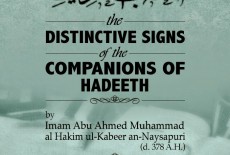I.Q of Einstein vs Imam Nasa’i
Imam Nasa’i is among the under marketed scholar. A giant and a league of titan himself , who is counted among one of the handful list of scholars entitled with the rank of a “Naaqid”. His biography, his wara’a , tasawwuf, hadeeth ilal master ship and many other skills are simply never ending and overwhelming.
The below example highlights his faqaahat or in other words his excellent sharp and genius deduction ability wherein he uses a hadeeth completely alien to the topic of talaaq (divorce) – to deduce rulings for the same topic.
in his sunan al-Kubra, under the chapter titled الطَّلَاقُ بِالْإِشَارَةِ الْمَفْهُومَةِ | (Meaning divorce using comprehensible gestures) The imam brought three ahadeeth. But what is truly mesmerising is his analogical deduction from these ahadeeth, especially the first one.
Hadeeth # 1:
هو حديث أنس في أنه كان للنبي r جار فارسي طيب المَرَقة ،) يعني يَطْبِخ طبيخًا جيدًا ،( وأن هذا الجار دعى النبي r ذات يوم ، وكان النبي عليه الصلاة والسلام جالس هو وعائشة ، فأَوْمَأَ هذا الجار الفارسي إلى النبي r أن تعالَ ، فأومأ إليه النبي r أومأ إلى عائشة ، يعني : وهذه معي ؟ فقال له الرجل : لا ، أنتَ وحدك ؛( كل هذا بالإشارة ، ما هناك كلام ، لا النبي r تكلم ، ولا الجار تكلم) . فكرر ذلك الجار هذه الإشارة ثلاث مرات ، وكرر النبي r الإشارة ثلاث مرات ؛( ما آتيك إلا أنا وعائشة نأكل من الطعام) ، فبعد المرة الثالثة وبعد أن امتنع النبي r ثلاث مرات أذن ذلك الرجل بأن يأتي هو – النبي r – وعائشة رضي الله عنها .
Anas radhiallahu `anhu reported that there was man of Persian descent as a neighbour to the Messenger of Allah sallalahu `alayhi wa sallam and he was excellent in preparing soup (and even food). And one day he invited the Messenger of Allah (sallalahu `alayhi wa sallam) to his house. The Prophet sallalahu `alayhi wa sallam and (mother of believers only) `Aisha were seated (in their house when the neighbour came) so the Persian using hand gesture only invited the Prophet (alone) but the Prophet sallalahu `alayhi wa sallam replied (using gesture) to invite `Aisha as well.
So the neighbour said No, but only you alone (and said all of this using gesture/sign only and there was no verbal speech between them. Neither the prophet spoke nor the neighbour. So the neighbour insisted on his request thrice using gestures/signs and so did the Prophet sallalahu `alayhi wa sallam reply via gestures alone clarifying that he will not come except if `Aisha is invited to eat from the menu as well.)
So after the prophet sallalahu `alayhi wa sallam refused thrice (to go alone), the neighbour then permitted both him and `Aisha (r.a) to come.
[Ref: Sunan al-Kubra 5/266, H: 5600 with explanations of the shurah within brackets, Also a variant is found in Saheeh Muslim 2037 ]
What happened in the hadeeth?
- Man came to the prophet while he was sitting with `Aisha and gestured him to come (for food)
- Prophet replied back using gesture that no unless Aisha is invited too
- Man gestured No, only you
- Prophet gestured No (Not until she is invited too)
- Man repeated this gesture twice or thrice and so did the prophet
- Man understood the gesture of the prophet accurately and agreed to let `Aisha join as well.
Why this narration is used within the chapter of talaaq is as explained as follows:
ذكره الإمام النسائي تحت باب : ” الطلاق بالإشارة المُفْهِمة ” يعني يرى أن الإشارة المفهمة قد يقع بها الطلاق ، مثل أن يكون مثلًا رجل يقع بينه وبين زوجته شِجَار ، فتقول له مثلًا : ” تطلقني ” ، يقول : … ؛ هذه إشارة مُفْهِمة ، الظاهر أنه عند النسائي أن هذه الإشارة المفهِمة تُوقِع الطلاق واستدل بهذا الحديث ؛ لأنه عند العلماء لا يجوز إذا خَصَّ الداعي رجلًا بالدعوة وقال له لا تأتِ بأحد معك ، أنه لا يجوز له أن يأتي برجل آخر ، فحِرْصُ النبي عليه الصلاة والسلام وإيمائه على عائشة ورضى ذلك الرجل بهذا الأمر ، يدل على أن النبي اعتبر هذه الإشارة واعتبر أنها لها حكمها الدال على معناها وكأنها : لا .
انظر دقة الاستنباط !! أمر بعيد ، قصة بعيدة تمامًا عن باب الطلاق ، يذكرها في كتاب الطلاق ويستنبط منها هذا الحكم الدقيق
The below passage is not a verbatim translation of the above but explanations and elaborations have been inserted as and when required for the english speaking audience.
The very fact that Imam nasa’i put this hadeeth under the aforementioned chapter of talaaq, shows that near Imam nasa’i rahimahullah a talaaq given via comprehensible gestures or signs is valid and does not necessarily need a verbal speech appended to it. Suppose a hypothetical case where a couple is going through a series of unsolvable issues so the wife asks her husband to divorce her ( تطلقني ). So he gestures with his hand (that go away or something), and she follows suit. So this gesture is what imam nasa’i titled the chapter with (i.e. divorce via comprehensible gestures).
The scholars have said that if the one inviting you did not give permission to bring extra then you should not. However this incident displays the protectiveness and love between the Prophet and his wife `Aisha wherein the prophet insisted on having her along for multiple reasons, one of which is also considering how she’d feel to be left out of such a good supper or the companionship.
So the gesture used by the prophet here was clear in its meaning and implication that he said he will not come if `Aisha is not invited too. The very fact that this gesture was comprehended by the neighbour and he eventually accepted his demand based on what the prophet’s gestures implied, proves that gestures are a valid form of method that can be used to give/ issue a talaaq between a husband and a wife. And based on this incident/hadeeth, we learn that verbal or written statement is not a pre-requisite or condition in talaaq.
Most of the other scholars have used this hadeeth to explain the importance of manners, the love between a husband and a wife and so on and so forth, however probably Nasa’i was the only one and the first one to use this hadeeth for such a genius analogy deduction.
قال النووي-رحمه الله تعالى- في شرحه:
(وَهَذَا مِنْ جَمِيل الْمُعَاشَرَة ، وَحُقُوق الْمُصَاحَبَة ، وَآدَاب الْمُجَالَسَة الْمُؤَكَّدَة)اهـ.
And this is from the most beautiful of ways of developing good relations (with one’s wife) and also shows the rights of your companion (wife or friend anyone) and (displays rulings applicable) among the manners of a gathering
For more such other deductions see: http://www.dd-sunnah.net/forum/showthread.php?t=156484
I have added this narration also under the article : HOW THE PROPHET MUHAMMAD TREATED HIS WIVES
Hadeeth # 2:
Abu Hurairah narrated that the Messenger of Allah said: “Look at how Allah diverts the insults and curses of Quraish from me. They insult ‘Mudhammam’ and curse ‘Mudhammam’ -but I am Muhammad.”
Imam nasa’i put this under the chapter of his Sunan:
باب الإِبَانَةِ وَالإِفْصَاحِ بِالْكَلِمَةِ الْمَلْفُوظِ بِهَا إِذَا قَصَدَ بِهَا لِمَا لاَ يَحْتَمِلُ مَعْنَاهَا لَمْ تُوجِبْ شَيْئًا وَلَمْ تُثْبِتْ حُكْمًا
Chapter: Saying Something, And Intending Something Other Than The Apparent Meaning, Carries No Weight
فذكره في باب : ” الإبانة والإفصاح بالكلمة الملفوظ بها ، وأنه إذا قُصِدَ بها ما لا يَحْتَمِلُه معناها لم تُوجِب شيئًا ولم تُثْبِت حكمًا ” ؛ هذا كلام الإمام النسائي .
يريد أن يقول الإمام النسائي : لو قال رجل لامرأته ” هي طالق ” ، ثم جاء عند القاضي قال : لا ، أنا ما قصدتُ الطلاق ، قصدتُ أنكِ حرة ؛ تذهبي إلى بيت أهلك أو كذا ، ما قصدتُ الطلاق الشرعي . يرى الإمام النسائي أن قوله هذا مقبول ويُصَدَّق في هذا القول ؛ لأن قريش لَمَّا كانت تَسُبُّ النبي عليه الصلاة والسلام كانت تسب مُذَمَّمًا ، كأنها تقول أنه ليس بمحمد ، هو مُذَمَّم ، فكانوا يشتمون مُذَمَّمًا ، فاعتبر النبي أن هذا الشتم والذم واللعن ليس عائدًا إليه ، مع إن كفار قريش يقصدون النبي عليه الصلاة والسلام ، ما يقصدون اللفظ ، يقصدون المسمى ، ما يقصدون الاسم ، فلما استخدموا اللفظ في غير المعنى المراد له صرف ذلك الحكمَ عن النبي .
If someone utters a statement which either in its meaning or by its application , implies something other than its original wording then this does not necessitate or enforce the ruling of what it was said/used for. Meaning, if a husband says to his wife hiyat-taaliq ” هي طالق ” so then the wife goes to the judge and the man is made to appear and says that I did not intend by the word ” هي طالق ” to mean you are divorced rather i meant that you are free to go to your family’s house or any other place you want. Then since the meaning of the word was not as the wife presumed, it is concluded that the divorce was not intended.
Thus his wording had a different meaning than what the wife assumed it did and therefore as Imam nasa’i’s sunan has a chapter ” Saying Something, And Intending Something Other Than The Apparent Meaning, Carries No Weight” . So if the husband apparently meant ” Go to your mother’s house” taking this sentence to mean ” Go forever and don’t come back” carries no weight.
This is why when the Quraish abused the prophet but used the word “Mudhammam” instead , the Prophet explained that they wanted to abuse Muhammad but their usage of word does not translate/imply towards me or my name therefore he considered the abuses hurled to fall on “Mudhammam” and not on “Muhammad”
Hadeeth # 3:
It has been narrated on the authority of Umar b. al-Khattab that the Messenger of Allah (ﷺ) said: (The value of) an action depends on the intention behind it.
This is pretty much self explanatory . If a man says to his wife ” Ukhruji bayti – Get out of my house” and intended by it as divorce then the divorce is valid. How is this category different than the above ? In the second hadeeth, the people wanted to Abuse Apple but they ended up abusing Orange and used the word Orange which neither shared any meaning or connection with an Apple. So their utterance of abuses on orange does not affect the Apple.
In hadeeth # 3 , if a man says get out of my house and if he was asked to clarify ” did you mean divorce by this statement and not merely that go talk a walk and come?” and he says “Yes” then the divorce takes place. So here, if the wording used is a synonym or different, and when asked to clarify he explains it meant talaaq then the divorce takes place even if the wording was different because here he clarified what his intention was + what his wording meant and both the wording and the intention meant divorce only unlike the second hadeeth where the wording meant something else and the intention was something else.
These 3 ahadeeth and their analogy based deduction by Imam nasa’i for the rulings of divorce conditions displays his fiqhi prowess
Buy the book and read a summarized detail about this book and the author from here: http://www.salafiri.com/biography-imam-ahmad-bin-shuayb-an-nasai-303h/
Btw, Some scholars or many scholars in fact assert that talaaq cannot take place until both the
- intention and
- speech/wording
are combined.
Imam ibn qudamah mentions that generic statement of inner thoughts or ambigious gestures in general aren’t accepted to condition talaaq. It has to be clear words. He quotes imams such as Yahya ibn abi katheer (a giant even before the era of malik or abu hanifa, btw whom students of knowledge know), `Ata and Jaabir ibn zayd, Sa`eed ibn Jubayr, Shaf`i, Ishaaq, Qaasim, Saalim, Hasan and sha`bi rahimahullah
Imam abu Muhammad ibn Hazam al-andalusi – the ferocious debater and dhaahiri imam , someone whose argument skills never fail to mesmerise me- rahimahullah said that it is not permissible for a ruler to pass a ruling of separation nor for a mufti to issue a fatwa separating a couple except on the basis of an established qur’anic verse or the prophetic tradition. He r.h then goes on to explain how the famous hadeeth ” Verily actions are based on intentions…” and uses it to argue that intention precede actions and intentions cannot be known unless it is put to action. Therefore verbal clearance is a must. He further says
إن من نوى الطلاق ولم يلفظ به، أو لفظ به ولم ينوه فليس طلاق، إلا حتى يَلْفِظ به وينوي
Whoever intends to divorce yet did not accompany it with clear speech or whoever uttered the wording but did not accompany it with proper intention then there is no talaaq except in the situation when the speech is accompanied with intention.
[Ref: al-Muhalla]
Shaykh `Izz ad-deen ibn `abdus-salaam r.h said “ I have not seen the likes of ibn hazam’s ‘muhalla’ and ibn qudama’s ‘al-mughni’ books ever! Imam dhahabi recorded this in his siyar and added imam bayhaqi’s sunan and imam ibn abdul birr’s ‘at-tamheed’
[Ref: Siyar `alam an-nubala 18/193]
Also scholars warn students from undertaking al-Muhalla independently because of how heavy and sensitive it is.
Imam ibn qayyum r.h also discussed this condition in `ilam al-muwaqqeen 3/55 under the chapter titled
فصل اعتبار النية والألفاظ في الطلاق







